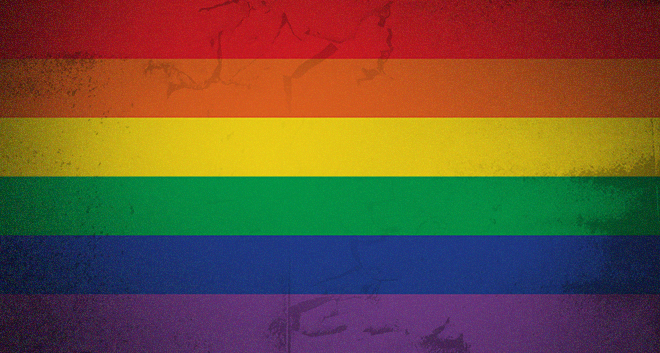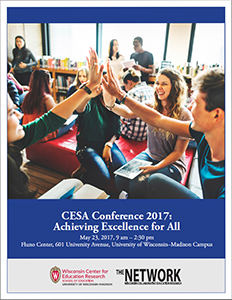CESA 2017
Every year, CESA members gather to hear from teams of UW–Madison researchers, Wisconsin PK-12 educators and community service providers who are working together to develop new ways to help school districts across the state engage and advance the academic success of all their students.
The CESA Conference 2017: Achieving Excellence for All, was held on May 25, 2017 at the Fluno Center on the University of Wisconsin campus.
Presentation topics for this event included:
- Pre-K Math
- Maker Spaces & STEM
- Personalized learning
- Mental health/mindfulness
- Student identity/LGBTQ
- Highly successful study skills
Videos, Presentations and Abstracts from CESA 2017
Opening Remarks
Diana Hess, Dean, University of Wisconsin–Madison School of Education and Karen A. Falk Distinguished Chair of Education

Session I: Health and Well-being of LGBTQ Students: Lessons Learned and Recommendations for Educators
Stephanie Budge, Assistant Professor, Counseling Psychology, UW–Madison Ezra Mauk, Counseling Psychology, UW–Madison
AbstractAbstract: This session focused on the experiences of LGBTQ youth in K-12 schools. First, data was shared that highlights specific aspects of social support, harassment, and academic achievement in relation to LGBTQ youth. Next, specific tools were offered to provide faculty, staff, and LGBTQ youth in schools. Finally, we shared personal stories working with youth, but also our own experiences to highlight the importance of what it means to provide supportive and safe school environments for LGBTQ youth.
Session II: Applying Principles from Psychological Science to Teaching and Learning
Catherine DeBrock, Graduate Researcher, Department of Educational Psychology, UW–Madison
AbstractAbstract: How can teachers promote durable, long-lasting learning? Although many teaching and study techniques have historically been thought to be effective in producing durable learning, what psychological science has to say may surprise you. After conducting over 100 years of research, psychological scientists have derived a list of learning principles that have been shown to support durable learning no matter the content, age group of learners, etc. Moreover, psychological scientists have also shown that other teaching and study techniques are not as effective as previously believed by educators. This session will provide an overview of these learning principles. Advice for integrating learning principles into teaching practices and students’ study habits will be discussed
Session III: Personalized Learning in Wisconsin
Rich Halverson, Professor, Educational Leadership & Policy Analysis; Co-Director, Wisconsin Collaborative Education Research Network Ryan Krohn, Director, Institute for Personalized Learning
AbstractAbstract: Personalized learning is the latest in a series of designs aimed at organizing schooling around learner interest. In today’s session, we will discuss what emerging practices of personalized learning look like, and how to support them, in order to support these practices to promote learning for all students. Rich Halverson and his UW-Madison Personalization in Practice research team will lead a group exercise about the principles of personalized learning, and Ryan Krohn, Director of the Institute for Personalized Learning, will discuss the process of getting personalized learning started in a school. Our presentation will address the key practices of personalized learning and will consider how school leaders can support personalized learning for all students.
Session IV: Cultivating Mindfulness within School Communities: Research and Practice
Kelly Petrie, Independent Contempative Educator, Oregon, WI and Lisa Thomas Prince, Outreach Specialist, Center for Healthy Minds, UW–Madison
AbstractAbstract: Mental and emotional well-being are necessary ingredients for the flourishing of students, teachers, staff, and school communities, yet how can this well-being be cultivated in a sustainable and skillful manner? This session will offer participants the opportunity to explore the relationship between mindfulness and well-being, through experiential practice and discussion. Results of research conducted in local schools by the UW Center for Healthy Minds will be highlighted. Practical applications of mindfulness programming implemented in one local suburban school district will be shared to offer a first-hand view of how to support mindfulness integration into school communities. Kelly Petrie, Independent Contemplative Educator, Oregon, WI Lisa Thomas Prince, Education Outreach Specialist, Center for Healthy Minds, UW–Madison
Session V: Because I’m Four! Examining Young Children’s Mathematical Thinking through Action Research
Gwyneth Hughes, Education Outreach and Partnerships, UW–Madison Alisa Belliston, doctoral candidate, Curriculum and Instruction, UW–Madison
AbstractAbstract: Presenters will discuss the structure and outcomes of a mathematics course for Pre-K, 4K, and Kindergarten teachers. The book used in the course, Young Children’s Mathematics, applies the Cognitively Guided Instruction model to connect early number concepts, problem solving, and equity issues. Teachers in this math course engaged with the book’s concepts in both online and in-person spaces and then applied the concepts to their own teaching contexts, studying the process through an action research cycle. Session attendees will examine this course structure in detail, with time for questions and comments. Attendees will also participate in selected activities to illustrate course content.
Session VI: The Maker Movement in Education: Definitions, Trends, and Findings
Erica Halverson, Associate Professor Curriculum and Instruction, UW–Madison, Rebecca Millerjohn, Madison Public Libraries
AbstractAbstract: In this session we will share with you our work on the Maker Movement in k-12 education. Making brings project-based learning into formal and informal learning environments through do-it-yourself, tinkering projects that focus on STEM and Arts skills and habits of mind. We will describe the history of the Maker Movement, findings from research on making in education, and recommendations for how to think about building making into schools. We will conclude by sharing the work we are doing in Madison Public Libraries to build making as a core service of library work including partnerships with community centers, schools, and after school programs across the city of Madison. Specifically, the “Making spaces” project aims to help schools design and implement makerspaces in their schools.
Keynote address: Why We Need Forgiveness Education in Schools
Abstract
Abstract: If the purpose of schooling is to prepare students for adult life, then what are we doing to prepare them to confront the deep challenges that unjust treatment can bring to so many? Consider a 35-year-old woman’s lament: “I was too busy trying to survive. I did not have room to bring forgiveness into my world.” These two sentences together, spoken by someone who lived with an abusive partner for decades, is a strong rationale for forgiveness education, starting with 4-or-5-year-olds. Do you see that the person, as an adult, did not have the energy and focus to add something new to her arsenal of survival? At the same time, can we mend the broken hearts of students, treated unfairly by others, so they can better focus, increase in academic achievement, and cooperate in the school setting? Forgiveness, as a way to reduce unhealthy anger, may be one of the most effective ways of confronting the effects of unfair treatment and returning a person to psychological health. In this talk, Professor Enright will be discussing the meaning of forgiveness, the scientific studies showing its effectiveness for adults and students, how teachers, guidance counselors, and school psychologists can implement forgiveness education with students, and how school administrators can create a just and forgiving school.



